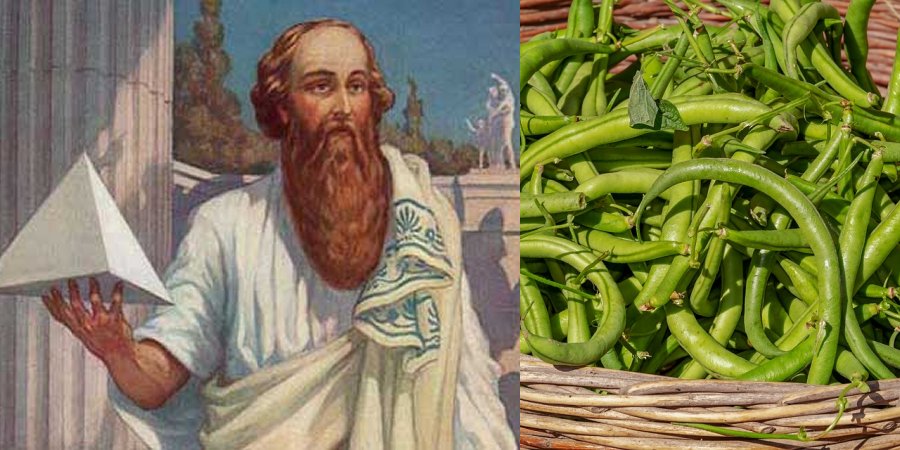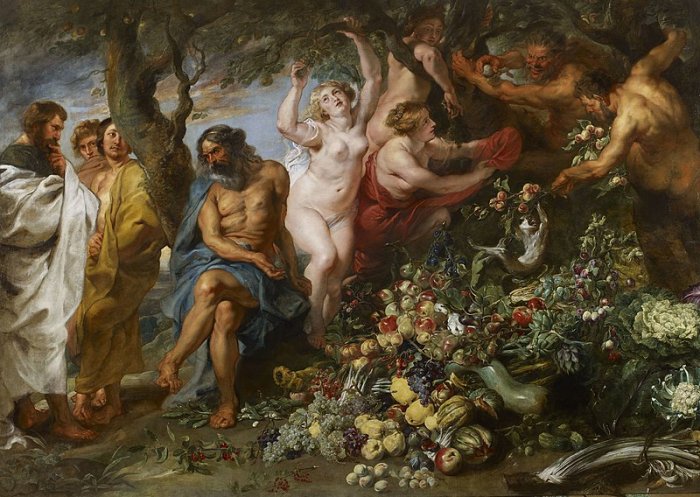Why Didn’t Pythagoras And His Followers Eat Beans?
Conny Waters - AncientPages.com - Pythagoras of Samos, an ancient Greek philosopher who made great contributions to mathematics and founded the Pythagorean School of Mathematics in Cortona, a Greek seaport in Southern Italy, was a vegetarian.
But did you know that Pythagoras abstained from meat and beans? Most vegetarians consume beans, but Pythagoras told his followers they mustn’t eat or even touch beans! Was Pythagoras worried about gastric problems, or did he have a deeper reason for omitting beans from the diet?
Left: Pythagoras. Credit: Famous Mathematicians. Right: Beans. Credit: Public Domain
The reason behind this is not entirely known, but there are certain theories that can provide some light on the great philosopher’s reluctance to beans.
Pythagoras believed that a person should strive for tranquility and peace. Beans were associated with metempsychosis, a philosophical term in the Greek language referring to the transmigration of the soul, especially its reincarnation after death. Pythagoreans believed that beans had the potential for life because they looked like human genitalia or fetuses.
Pythagoras conducted a scientific experiment demonstrating that humans and beans were spawned from the same source. He took some beans and buried them in the mud. They rested there for a few weeks before being removed and investigated by the great Greek philosopher. He concluded they looked like human fetuses.
Like ancient Egyptians, Greeks knew that fava beans could be deadly. Pliny wrote that followers of Pythagoras believed that fava beans were connected to Hades, the Greek God of the Dead, and the Underworld. The plants’ black-spotted flowers and hollow stems served as ladders for human souls and were associated with reincarnation.
Aristotle suggested that the bulbous shape of beans represented the entire universe, which was why beans shouldn’t be consumed.
Cicero proposed another explanation. In his book On Divination, he just wrote that he believed the Pythagoreans didn’t eat beans because they caused flatulence.
Pythagoras advocating vegetarianism. Painting made between 1618 and 1630. Credit: Public Domain
Another theory is that Pythagoras may not have had anything against beans at all. However, beans were used in ancient Greece as a ballot system. White beans represented a yes vote and black a no.
When Pythagoras said to his disciples, "Abstain from beans," he had no reference to them as an article of diet, for he ate them himself, but he advised his students not to get caught up in politics or government.
As H. L. Sumner points out, “what he did mean, and what his immediate followers already understood, was that they should abstain from the intrigues of politics as being antagonistic to a philosopher's pursuits.”
To put it in plain text – We do know that Pythagoras had disapproved of beans, but we simply don’t know what was behind his negative attitude.
Updated on November 24, 2023
Written by Conny Waters – AncientPages.com Staff Writer
Copyright © AncientPages.com All rights reserved. This material may not be published, broadcast, rewritten or redistributed in whole or part without the express written permission of AncientPages.com
Expand for referencesMore From Ancient Pages
-
 Chaco Canyon Mystery Solved By Scientists Hauling Logs On Their Heads
Archaeology | Feb 23, 2023
Chaco Canyon Mystery Solved By Scientists Hauling Logs On Their Heads
Archaeology | Feb 23, 2023 -
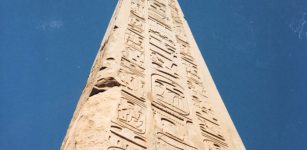 How On Earth Did The Ancient Egyptians Raise Their Colossal Obelisks?
Featured Stories | Feb 14, 2022
How On Earth Did The Ancient Egyptians Raise Their Colossal Obelisks?
Featured Stories | Feb 14, 2022 -
 Giant 7,000-Year-Old Astronomical Calendar Discovered In Poland?
Archaeology | Dec 22, 2017
Giant 7,000-Year-Old Astronomical Calendar Discovered In Poland?
Archaeology | Dec 22, 2017 -
 India’s Tradition Of Advanced Metallurgy, Craftsmen And Blacksmiths Is Longer Than Thought
Ancient Technology | Mar 19, 2019
India’s Tradition Of Advanced Metallurgy, Craftsmen And Blacksmiths Is Longer Than Thought
Ancient Technology | Mar 19, 2019 -
 Strange Engraving Made By Knights Templar In French Village – It Doesn’t Make Sense Or Does It? – Part 2
Ancient Mysteries | Oct 9, 2019
Strange Engraving Made By Knights Templar In French Village – It Doesn’t Make Sense Or Does It? – Part 2
Ancient Mysteries | Oct 9, 2019 -
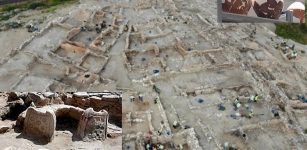 Anatolia’s Seyitömer Mound Was Inhabited In Bronze Age, Achaemenid, Hellenistic, And Roman Times
Archaeology | Aug 17, 2020
Anatolia’s Seyitömer Mound Was Inhabited In Bronze Age, Achaemenid, Hellenistic, And Roman Times
Archaeology | Aug 17, 2020 -
 Cuchulainn: Irish Mythical Hero And His Cruel Magical Spear Gae Bolg
Celtic Mythology | Jun 6, 2017
Cuchulainn: Irish Mythical Hero And His Cruel Magical Spear Gae Bolg
Celtic Mythology | Jun 6, 2017 -
 Underground Civilizations – True Rulers Of Earth – Part 1
Ancient Mysteries | May 7, 2019
Underground Civilizations – True Rulers Of Earth – Part 1
Ancient Mysteries | May 7, 2019 -
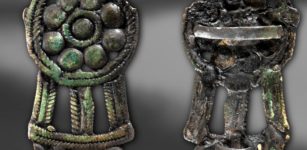 Hunter-Gatherer Metallurgy In The Early Iron Age Of Northern Fennoscandia Was Integrated And Advanced
Archaeology | Aug 15, 2023
Hunter-Gatherer Metallurgy In The Early Iron Age Of Northern Fennoscandia Was Integrated And Advanced
Archaeology | Aug 15, 2023 -
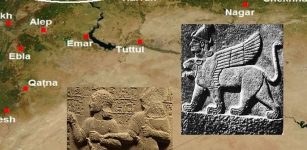 Ancient City Of Carchemish Will Soon Be Ready To Show Its Historical Treasures
Archaeology | Jun 20, 2019
Ancient City Of Carchemish Will Soon Be Ready To Show Its Historical Treasures
Archaeology | Jun 20, 2019 -
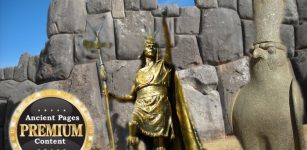 The Untold Story Of Sacsayhuamán – Falcon’s Place Is Not What It Seems
Ancient Mysteries | Apr 28, 2020
The Untold Story Of Sacsayhuamán – Falcon’s Place Is Not What It Seems
Ancient Mysteries | Apr 28, 2020 -
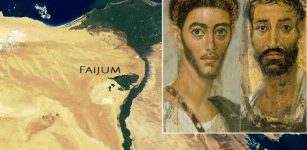 Faiyum Mummies: Long Lost Secrets Of A Mummy’s Portrait
News | Nov 24, 2020
Faiyum Mummies: Long Lost Secrets Of A Mummy’s Portrait
News | Nov 24, 2020 -
 New Underwater Discoveries Made Around The Antikythera Shipwreck
Archaeology | Jul 21, 2023
New Underwater Discoveries Made Around The Antikythera Shipwreck
Archaeology | Jul 21, 2023 -
 Are The Ten Commandments Based On The Forty-Two Principles Of Maat That Appeared 2,000 Years Earlier?
Biblical Mysteries | Jul 15, 2017
Are The Ten Commandments Based On The Forty-Two Principles Of Maat That Appeared 2,000 Years Earlier?
Biblical Mysteries | Jul 15, 2017 -
 Modern Humans Did Not Enter Europe By Sea – New Study Says
Archaeology | Mar 7, 2022
Modern Humans Did Not Enter Europe By Sea – New Study Says
Archaeology | Mar 7, 2022 -
 A 500-Year-Old Funerary Bundle And Pottery Probably Belonging To Ychsma Culture – Unearthed Near Lima, Peru
Archaeology | May 22, 2023
A 500-Year-Old Funerary Bundle And Pottery Probably Belonging To Ychsma Culture – Unearthed Near Lima, Peru
Archaeology | May 22, 2023 -
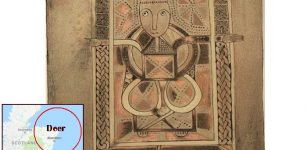 Book Of Deer And The Lost Scottish Monastery – Archaeologists Report New Finds
Archaeology | Jan 10, 2018
Book Of Deer And The Lost Scottish Monastery – Archaeologists Report New Finds
Archaeology | Jan 10, 2018 -
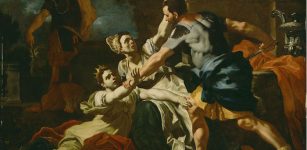 Ancient Roman Laws Give Us A Window Into A World Of Abuse
Featured Stories | May 24, 2022
Ancient Roman Laws Give Us A Window Into A World Of Abuse
Featured Stories | May 24, 2022 -
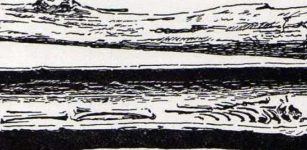 Ancient Burial Of A Princess Who Fell Off A Cliff Raises Many Questions
Archaeology | Apr 18, 2019
Ancient Burial Of A Princess Who Fell Off A Cliff Raises Many Questions
Archaeology | Apr 18, 2019 -
 Ancient City Machu Picchu Was Originally Called Huayna Picchu By The Incas – Study Of The Name Reveals
Archaeology | Mar 23, 2022
Ancient City Machu Picchu Was Originally Called Huayna Picchu By The Incas – Study Of The Name Reveals
Archaeology | Mar 23, 2022

